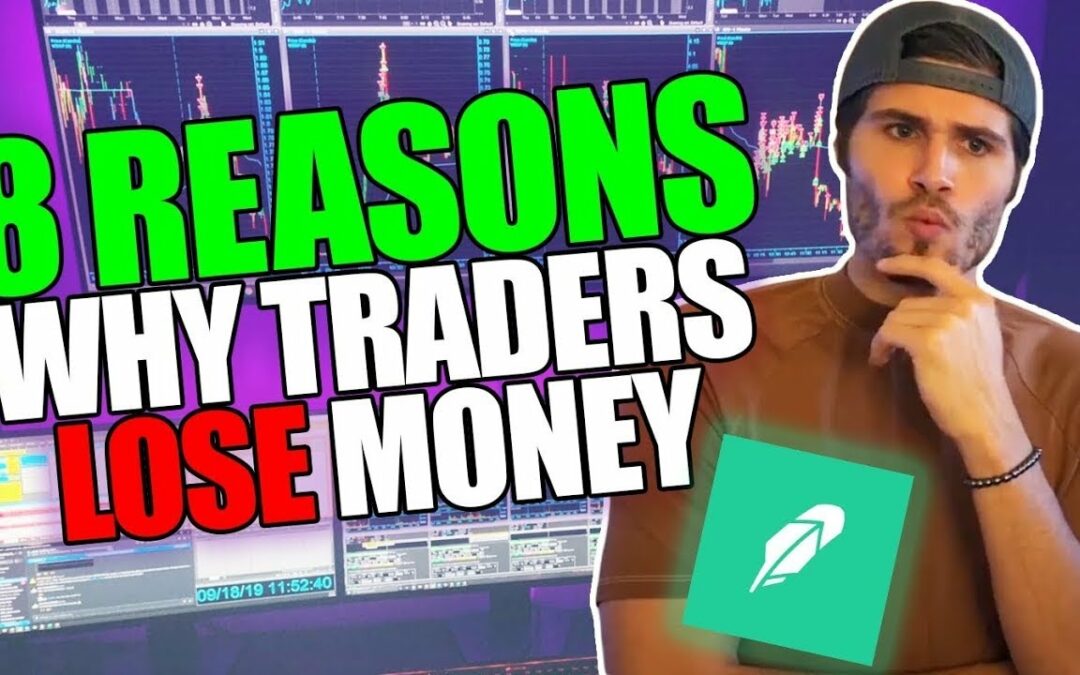Do you day trade? Many people day trade because they believe it’s a quick and easy way to make money. However, the majority of day traders lose money. In this article, Tosh Bradley explains the eight major reasons traders why day traders lose money. If you’re looking to become a successful day trader, it’s important to be aware of these common mistakes to avoid them. Read on to learn more!
Hey, guys, what’s up? It’s Tosh Bradley (@TBradley90). I see many traders losing out there, and it’s bothering me. Let’s have a heart-to-heart and discuss the eight major reasons traders lose money on day trading.
Day Trading From Your Smartphone
The mobile traders out there, the Robinhooders, cannot win in this industry. I cannot stress this enough. After a seven-year career in trading stocks in the stock market, I have concluded that it is almost guaranteed 100%. The only people who make money day trading are those who show up to the market daily with a plan. They’re making a watch list, running their scans, seeing what’s moving, and then zeroing in on those opportunities and trading with a plan. The day traders that are on their smartphones thinking, “Wow, this is a great buy,” or “give me an alert,” are the traders that lose.
Chatroom Guru Trading Alerts
There are what’s called “pumpers” out there. If you are, are you a fake guru? What they are doing is marketing, not trading. You will read, “I turned a $1,000 account into $15 million.” The so-called guru is driving around in expensive, exotic cars and taking extravagant vacations. Day trading gurus sell the lifestyle. The lifestyle is the hook, the pump. These so-called gurus are marketers, not professional day traders. They are going live on YouTube and talking about the stocks they are buying, luring the thousands of people watching into following their trade. When the watchers start buying, the price goes up, and more watchers have a fear of missing out (FOMO), and they start buying as well. The watchers are pushing the price higher on pure emotion. The guru will take that opportunity to sell and “dump” their position on the watchers.
Have you ever seen the Wolf of Wall Street? These marketers are hiding behind disclaimers the same way Jordan Belfort tried to hide. The only people that make money in these environments are the ones controlling the price; the marketers. Following these marketers will not make you profitable and most certainly won’t make you rich. You may get lucky on one or two alerts, and then on the third one, you lose your winnings and more.
The Foolproof Business Model
A marketer claiming to be a guru will portray themselves as a family man and claims to have your best interests in their heart. Your guard is almost immediately down since you feel like you can trust them. They are wolves in sheep’s clothing.
They claim they alert their trades for “educational purposes.” They will say, “don’t follow my trades. I’m showing how I do it so you can repeat what I do for yourself, but don’t follow me.” They stream it live to all of their members, and the members will follow up the pump and create an artificial move. They get the move they want, place a sell order when you’re buying and chasing at highs because they promised you the strategy works. The stock price dumps, and you’ll have to sell at a big loss because it’s a terrible company.
Then the marketer will go to social media and grab a few screenshots from members who were able to get out before the dump, start bragging about members’ successes, and bid you to “join today!”
If you chase alerts and follow someone else’s stock pick, that’s not how things work in the real world. You might make money once or twice, but you’ll be broke the following year, the next month.
The best way to cut down your learning curve and succeed as a day trader is to join a community that provides education without alerts and mentors you to do it yourself without the help of the teachers. The key to successful day trading is self-sufficiency and learning a process and strategies that work without the manipulation of a marketer.
Risk Management
You need stop-losses in your trading. If you don’t have hard stops in your trading, it could all be gone one day. If you’re a new day trader, it’s tough to understand the importance of risk management.
In day trading, traders use two types of stop-losses: mental stops and hard stops. A mental stop loss is when you tell yourself, “I’m not going to lose more than this amount on this trade.” The price or amount is a subjective number you decide on, and you manually exit if that number is reached. A hard stop loss is when you place an order to sell the stock at a specific price to limit your losses. Hard stops remove emotion from the equation, preventing you from losing more money than you intended on a trade.
Paper trade on a simulator with hard stops and get used to how they work. It takes some testing to figure out how and where to place your hard stops.
Day Trading Process and Routine
A day trader’s routine should be structured to allow flexibility, focus, and consistency.
The routine for a day trader should include time for research, analysis, and planning, and it is important to be well-prepared before entering any trades. A day trader should also have specific times set aside for monitoring the markets and making trades.
Being disciplined is critical when it comes to day trading. Routines help ensure that you stay on track and focus on your goals. Having a solid routine in place can minimize distractions and maximize your profits.
I’m creating a watch list and plotting the support and resistance levels I’m interested in using to make trades every day. Let’s say 16 stocks are running. I am forming a thesis based on backtesting, based on experience, data tracking, and criteria to narrow that list down to the top four stocks I want to trade.
I ask myself several things to narrow down a list of stocks, such as the following:
-
- What is the money flow to the stock?
- What are the shares outstanding?
- What is the short float percentage?
There’s a lot to know in trading, but KISS, keep it super simple. The more complicated you make your process, the more difficulty you will have when trying to become successful. Many traders experience paralysis by analysis, and traders become overwhelmed with the amount of information they can gather and make assumptions that all of it is important to the trade. Well, it’s not.
Day Trading Doesn’t Have a Holy Grail
There’s no Holy Grail in trading. If any one of those marketers mentions, “we got this perfect setup, and it’s Bollinger Bands.” It’s all bull, and they’re trying to feed you some phony, baloney stuff. Trading is a complex industry, and it’s not easy, but trading can be simplified.
There is no one Holy Grail strategy out there that will make everyone billions of dollars. 99% of traders wouldn’t fail if there were this one strategy that X-Y-Z pumper alerts and everybody can buy a private island based on the profits that they’re getting from that. That’s not realistic. So trading, while it is hard, can be more accessible through the simplification of the process.
Profits Before Education
Profits-before-education is the most backward thinking I’ve ever heard in my entire life. Do you think doctors go to medical school before they become doctors? Do you don’t think students become lawyers before they go to law school? No, students must invest in their education. Without education and a mentor, a student’s odds of success are skewed so strongly against them that it becomes nearly impossible to succeed.
For example, let’s say Trader A has $5,000. Trader A thinks, “I’m going to do it myself, man, and then I’ll invest in an education later and join a chat room only if it helps me.” Trader B has $5,000 as well. Trader B invests in a mentorship like My Investing Club and receives one-on-one mentorship from verified millionaire traders. Trader B has better odds of success than Trader A even though Trader B has a smaller account size.
A mentor can:
-
- Help you to focus on your goals and keep you accountable.
- Provide you with support and guidance throughout your day trading journey.
- Teach you the ropes of day trading and help you to avoid costly mistakes.
- Give you access to their years of trading experience and knowledge.
- Help you to develop a successful day trading strategy that fits your personal needs and risk tolerance level.
Trader B will have much better odds of being successful as a trader in a much shorter amount of time and is more likely to avoid costly mistakes that take years to learn.
Bottom Line
Day trading can be profitable if you invest in your education before trying to make profits and have a solid routine in place. Without proper education, traders are likelier to lose money during day trading.
What’s Next?
Join our free 1-hour webinar to learn our strategies and improve your day trading today!

